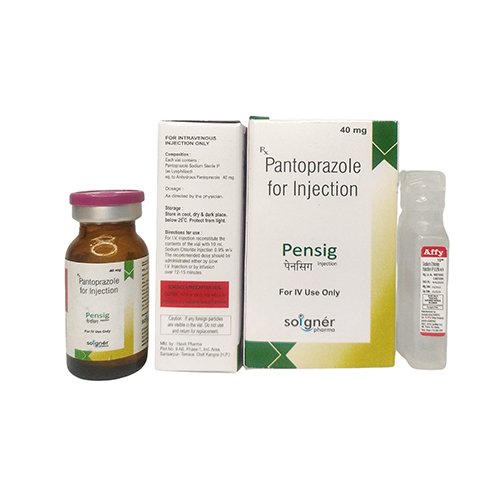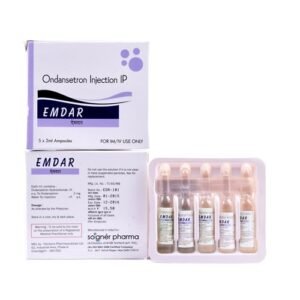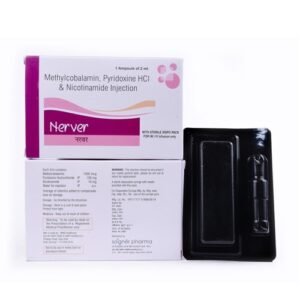- A company that meets the needs of people around the world through superior products and services
Products List

PENSIG is the composite of Pantoprazole Injection that is used as a short-term therapy for reflux disease, in which backward passage of acid from the stomach produces heartburn and possibly damage to the food pipe in persons who have undergone esophageal damage and are unable to take pantoprazole orally.
It is used to treat stomach and intestinal acid-related disorders such as acid reflux, indigestion, peptic ulcer disease, and various other stomach problems connected with excessive acid production. Pantoprazole Injection is also used to avoid stress ulcers in critically sick patients, and it is given before anaesthetics to assist reduce aspiration-related problems.
It belongs to a class of medications known as proton pump inhibitors, which act by lowering the amount of acid in the stomach, so relieving acid indigestion and heartburn. In this way this injection works against the acidic substance produced by the food in the stomach.
Benefits Of Pantoprazole Injection
- Cure gastro issues from its root.
- Widely used for peptic ulcer disease.
- It is used to reduce acid made by the stomach.
Direction To Use This Medicine
Pantoprazole Injection is given to the patient by a healthcare professional and is only provided if the doctor believes that an injection is more appropriate at the time than a pill. The dose will be determined by the patient’s condition and response to the medication.
Precautions For Pantoprazole Injection
The duration of therapy is also determined by the doctor, but even if the symptoms vanish rapidly, the patient should continue to take it as directed. Do not consume any heavy meals such as meat, and foods contain high amounts of oil. This also includes foods that make uric acids in the stomach.
Side Effects Of Pantoprazole Injection
Pantoprazole Injection may cause some side effects which need to be kept in mind, commonly it causes issues in the stomach such as making it upset. Although there are very rare chances this becomes a cause of any serious health issue. However, meet the doctor in this case immediately if the condition becomes worse just after taking this injection.
- Nausea
- Headache
- Vomiting
- Dizziness
- Diarrhea
- Flatulence
- Joint pain
- Stomach pain
- Thrombophlebitis
Pharmacology
Pharmacodynamics: – Pantoprazole act by selectively inhibiting the H+/K+ – ATPase enzyme in the secretory canaliculus of the stimulated parietal cell. Within this cell, the function of the enzyme is to secrete acid by forcing an exchange of H3O+ for K+ when a K+ -Cl- pathway is parallel to the pump. The result of pump turnover is the secretion of HCl into the stomach. This is the final common pathway for acid secretion. Pump inhibition blocks acid secretion regardless of whether it originates from stimulation of muscarinic, gastrin, or histamine receptors
Pharmacokinetics: –
• Absorption and Distribution: – Following intravenous administration of pantoprazole, serum/plasma concentrations decline biexponentially. The terminal half-life (t½) is about 1 hour. The total serum clearance is approximately 0.1 l/h/kg and the volume of distribution is about 0,15 l/kg. The plasma kinetics for pantoprazole after both oral and intravenous administration is linear over the dose range 10 to 80 mg.
• Metabolism: – Pantoprazole is almost exclusively metabolised in the liver. The main metabolite is desmethyl-pantoprazole, which is conjugated with sulphate.
• Elimination: – Renal elimination represents the most important route of excretion (approximately 80%) for the metabolites of pantoprazole. The balance is excreted with the feces. The half-life of the main metabolite is approximately 1½ hours which is slightly longer than that of pantoprazole. A slight increase in AUC and Cmax occurs in elderly volunteers compared with younger patients.
Indications: – The FDA-labeled indication is for the short-term treatment (up to 16 weeks) of erosive oesophagitis associated with GERD. Other possible uses may include the maintenance treatment of erosive oesophagitis, acute or maintenance treatment of duodenal or gastric ulcers, treatment of pathological hypersecretory conditions, and adjunct treatment with antibiotics for Helicobacter pylori. Pantoprazole i.v. is indicated for the short-term treatment (7 to 10 days) of GERD in patients unable to take the oral formulation.
| Pack Size | VIAL |
|---|---|
| Brand Name | PENSIG Inj |

 Get a Quote
Get a Quote




